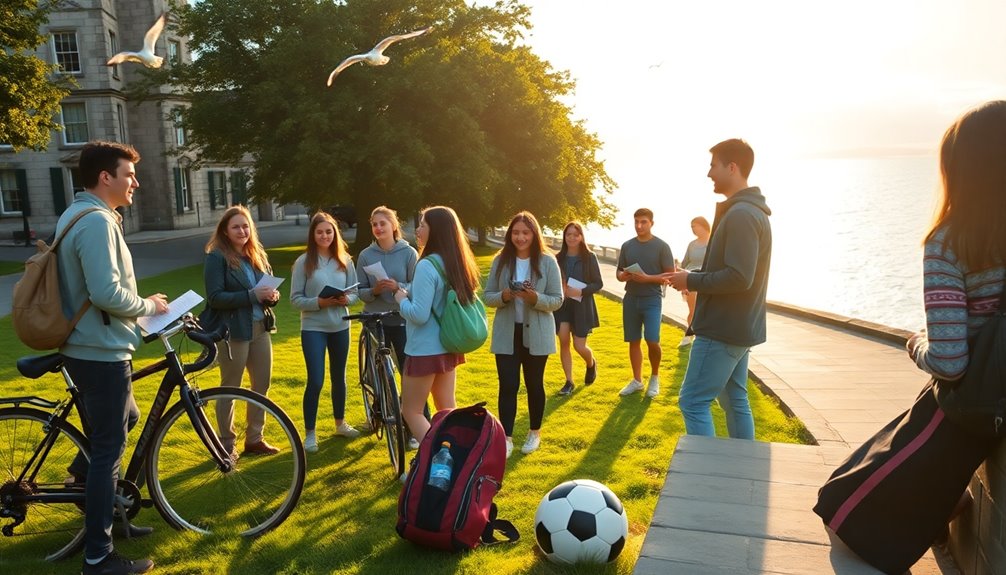
Pick a course that fits your level and goals, and test honestly so you’ll learn fast. Choose classes with clear syllabuses and small groups for more feedback. Book accommodation near public transport or campus to cut commute stress. Gather visas, tickets, insurance and health documents early and keep digital backups. Learn basic Irish greetings and pub etiquette to connect with locals. Plan weekend outings for real speaking practice. Keep going for practical planning, packing and budgeting tips.
Highlights
- Choose a course that matches your level and goals (conversation, exam prep, or immersion) and review the syllabus for clear outcomes.
- Book accommodation near campus or reliable transit and confirm safety, groceries, and commute times before arrival.
- Pack travel documents, insurance, student ID, and digital backups; register with the school and embassy if advised.
- Practice daily: join language exchanges, visit cafés/markets, and use class feedback to speak confidently in real situations.
- Set a weekly budget, use student discounts, cook with flatmates, and track expenses with an app to stretch your euros.
Choose a Course That Matches Your Goals and Level
How do you pick a course that actually moves you forward? You’ll start by testing your level honestly, then narrow course selection to programs that match your needs—conversation, exam prep, or immersion. Look for clear syllabuses, measurable outcomes, and teachers who push you without micromanaging. Prioritize goal alignment: choose courses whose structure, intensity, and duration fit your timeline and freedom to travel or work. Ask about class size, feedback frequency, and real-world practice opportunities. When a course respects your autonomy and advances specific skills, you’ll gain confidence faster and spend your time abroad productively.
Book Accommodation Near Public Transport and Classes
When booking accommodation for your summer course, prioritize places close to transit stops so you can reach the city and sights quickly. Aim for options within walking distance of campus to save time and reduce daily stress. Also check that grocery stores and basic amenities are nearby so you can settle in comfortably.
Close to Transit Stops
1 practical reason to choose accommodation near transit stops is that it saves you time and reduces daily stress: short walks to buses, trams, or trains make it easier to attend morning classes, explore on weekends, and get back quickly after study sessions. Pick a place with reliable public transport links so you can roam freely without renting a car. Staying close to stops opens up more options for spontaneous trips to local attractions, cafes, and evening events. You’ll have flexibility to shape your days, arrive refreshed for lessons, and make the most of Ireland’s coastlines and city culture.
Walking Distance to Campus
Choosing accommodation within a short walk of campus makes your day simpler and more productive: you’ll cut commute time, arrive for classes relaxed and on time, and have extra hours for studying or exploring. Pick a spot that lets you shift between lectures and campus exploration easily, so spontaneous plans feel natural. Short walks reduce the stress of student commuting and give you freedom to craft your schedule. Check walking routes at different times, consider safety and lighting, and prioritise direct paths over gimmicks. When you’re close, you’ll feel more connected, independent, and ready to make the most of your summer.
Nearby Grocery and Amenities
Because you’ll be splitting time between classes, exploring, and downtime, pick accommodation with easy access to grocery stores, pharmacies, and basic services so errands don’t eat into your schedule. Choose a spot near local supermarkets and transport hubs so you can grab supplies fast, cook when you want, and keep costs down. Check that essential services — pharmacies, post offices, laundries — are walking distance or a short bus ride away. Prioritize neighborhoods with evening options and safe streets. That freedom to move and manage daily life lets you focus on lessons, meetups, and spontaneous weekends without logistical stress.
Prepare Essential Travel and Study Documents in Advance
Before you travel, gather and organize every document you’ll need for both entry into Ireland and your time studying there. Check visa requirements early, copy passport and acceptance letters, and confirm accommodation details. Buy travel insurance that covers medical care, theft, and course interruptions; keep policy and emergency numbers at hand. Print tickets, student ID, and any health records or prescriptions, and store digital backups in the cloud and offline. Register with your school and local embassy if recommended. Having paperwork sorted frees you to focus on learning and exploring, confident you’ll handle any routine admin or unexpected hiccups.
Learn Key Local Phrases and Cultural Etiquette
When you arrive, learning common Irish greetings like “hello” and “how are you?” will help you make instant connections. Pay attention to polite conversational habits—listening, using please and thank you, and letting others finish—so your interactions feel natural. Also learn basic pub and social manners, such as buying a round or queuing respectfully, to fit in comfortably at social gatherings.
Common Irish Greetings
Although you’ll hear a range of accents and expressions across Ireland, a few simple greetings will help you connect quickly and show respect for local customs. Learn “hello” and “goodbye,” try “how are you?” with a friendly tone, and use “thanks” sincerely. Be aware of cultural nuances and regional variations: in some places a casual nod suffices, elsewhere a firm handshake feels right. Use first names when invited, mirror warmth, and keep phrases short and confident. Practicing these essentials lets you move freely, make friends faster, and show genuine interest in people and place.
Polite Conversational Habits
Knowing a few greetings gets you noticed; building polite conversational habits helps you keep the connection. You’ll want to learn local phrases—short, friendly, and sincere—to show you respect culture and casual freedom. Practice active listening: nod, paraphrase, and let pauses breathe so others feel heard. If you must jump in, use respectful interruptions—“Sorry, can I add?”—to avoid cutting someone off. Match formality to setting; be warm but not overfamiliar. Smile and use names when appropriate. These habits help conversations flow naturally, open doors to deeper friendships, and let you explore Ireland with confidence and ease.
Pub and Social Manners
Wondering how to fit in at an Irish pub? You’ll want to learn simple pub etiquette: order at the bar, wait your turn, and buy rounds if someone’s invited you. Use friendly greetings and light humor; locals value warmth and quick wit. Respect personal space, listen more than you speak at first, and match the group’s energy. For smoother social interactions, pick up phrases like “How’s the form?” or “Grand” to show you’re tuned in. Stay open, drink responsibly, and don’t push topics like politics. Do this and you’ll make genuine connections while keeping your freedom intact.
Pack Smart for Ireland’s Unpredictable Summer Weather
Because Irish summers can flip from sun to shower within an hour, you’ll want to pack layers and weather-proof essentials rather than trusting a single outfit. Bring versatile pieces for layering clothing—light tees, a fleece or jumper, and a thin down or packable jacket. Include waterproof essentials: a compact raincoat, a small umbrella, and waterproof shoes or gaiters if you’ll explore coastlines. Quick-dry fabrics save space and let you move freely. Pack a neutral scarf or buff for warmth and style. With smart choices you’ll stay comfortable, adventurous, and ready for whatever Irish weather hands you.
Use Weekends for Practical Language Practice and Excursions
While your weekday classes build grammar and vocabulary, weekends are where you’ll put that learning into real-life use—so plan outings that force you to speak and listen. Seek markets, cafés and coastal walks where locals chat; challenge yourself to order, ask directions and join conversations. Organize a language exchange with classmates and Irish friends, swapping questions and stories. Choose excursions that deepen cultural immersion—museums, music sessions, village fairs—so your English grows naturally. Don’t just observe: participate. These deliberate, freeing weekend choices turn classroom knowledge into confident speech, broaden your social circle, and make the experience truly yours.
Manage Your Budget With Student-Friendly Tips and Apps

A few smart habits and the right apps will keep your summer in Ireland affordable without cutting out fun. You’ll set a simple weekly budget, track expenses with budgeting apps, and prioritize experiences over stuff. Hunt student discounts for transport, museums, and cafés—always ask, show your ID, and join campus or city student groups for deals. Cook with flatmates, use local markets, and choose free events to stretch funds while staying social. Automate small savings and monitor exchange rates before big purchases. With these steps you’ll keep control, enjoy freedom, and make every euro count.
Some Questions Answered
Can I Work Part-Time While on a Short Summer Course?
Generally, no — you usually can’t work part-time on a short summer course unless your student visa explicitly permits it. Check Ireland’s work regulations carefully before planning to earn while studying. Contact your course provider and Irish immigration to confirm visa conditions and permitted hours. If you crave freedom, arrange voluntary experiences, internships arranged through the school, or delay work plans until you hold a longer-term student visa that allows employment.
Are Meals Included With Homestay Accommodation?
Yes — meals are usually included with homestay accommodation, serving as your daily anchor in a new place. You’ll discuss meal preferences and dietary restrictions beforehand so hosts can plan appropriately. Expect breakfast and dinner most days; lunches may be packed or self-catered depending on the family. Be clear and polite about needs, and you’ll enjoy home-cooked meals that support your freedom to explore while feeling cared for.
Is Travel Insurance Mandatory for Visa Purposes?
Yes — for visa requirements you’ll usually need travel insurance that covers medical emergencies and repatriation. Don’t gamble: verify required coverage limits and policy dates with the Irish embassy or consulate handling your application. Get proof of a valid policy before you apply, and keep copies while you travel. Choosing extensive insurance gives you freedom to explore, knowing medical costs or unexpected disruptions won’t derail your plans.
Can I Extend My Course After Arriving in Ireland?
Yes — you can usually extend your course after arriving in Ireland, but you’ll need to check course extension procedures and visa requirements first. Contact your school early to confirm availability and paperwork; they’ll advise on letters or confirmations you’ll need. If your current visa won’t cover the extended dates, apply for an extension through Irish immigration promptly. Staying proactive keeps your plans flexible and free from unexpected legal issues.
Are There Options for Evening Language Classes Only?
Yes — you can find evening classes focused on conversational skills and exam prep. You’ll discover language schools that run flexible, part-time evening classes so you can work or travel by day and study by night. Check schedules and levels in advance, ask about class sizes and teaching style, and confirm start dates. Choosing schools with rolling enrolment gives you freedom to join when it suits your plans.
Summing Everything Up
Picture yourself stepping out into a misty emerald morning, course books under your arm and a friendly town to explore. With the right program, handy transport, and documents in order, you’ll focus on learning while enjoying local conversation over tea. Pack layers, save smart, and use weekends to turn lessons into memories. Follow these tips and you’ll leave Ireland more confident, fluent, and packed with stories worth sharing.
